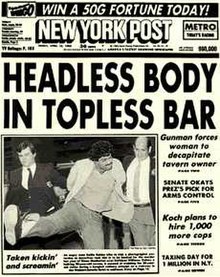
From Wikipedia: The New York Post is the 13th-oldest newspaper published in the United States and is generally acknowledged as the oldest to have been published continuously as a daily, although – as is the case with most other papers – its publication has been periodically interrupted by labor actions.[2] Since 1993, it has been owned by media mogul Rupert Murdoch's News Corporation, which had owned it previously from 1976 to 1988. It is the seventh-largest newspaper in the U.S. by circulation.[3] Its editorial offices are located at 1211 Avenue of the Americas, in New York City, New York. The Post is known for its sensationalist headlines.
The Murdoch years
Murdoch imported the sensationalist "tabloid journalism" style of many of his Australian and British newspapers, such as The Sun (the highest selling daily newspaper in the UK). This style was typified by Post's famous headlines such as “Headless body in topless bar”. In its 35th-anniversary edition, New York Magazine listed this as one of the greatest headlines ever. It also has five other Post headlines in its "Greatest Tabloid Headlines" list.[25]
Because of the institution of federal regulations limiting media cross-ownership after Murdoch's purchase of WNYW-TV to launch the Fox Broadcasting Company, Murdoch was forced to sell the paper for US$37.6 million in 1988 to Peter S. Kalikow, a real-estate magnate with no news experience.[26] When Kalikow declared bankruptcy in 1993,[26] the paper was temporarily managed by Steven Hoffenberg,[26] a financier who later pleaded guilty to securities fraud;[27] and, for two weeks, by Abe Hirschfeld,[28] who made his fortune building parking garages. After a staff revolt against the Hoffenberg-Hirschfeld partnership — which included publication of an issue whose front page featured the iconic masthead photo of Alexander Hamilton with a single tear drop running down his cheek[29]—The Post was repurchased in 1993 by Murdoch's News Corporation. This came about after numerous political officials, including Democratic governor of New York Mario Cuomo, persuaded the Federal Communications Commission to grant Murdoch a permanent waiver from the cross-ownership rules that had forced him to sell the paper five years earlier.[30] Without that FCC ruling, the paper would have shut down. Under Murdoch's renewed direction, the paper continued its conservative editorial viewpoint.
Criticism
The Post has been criticized since the beginning of Murdoch's ownership for sensationalism, blatant advocacy and conservative bias. In 1980, the Columbia Journalism Review opined that "the New York Post is no longer merely a journalistic problem. It is a social problem – a force for evil."[31]
Perhaps the most serious allegation against the Post is that it is willing to contort its news coverage to suit Murdoch's business needs, in particular that the paper has avoided reporting anything that is unflattering to the government of the People's Republic of China, where Murdoch has invested heavily in satellite television.[32]
Ian Spiegelman, a former reporter for the paper's Page Six gossip column who had been fired by the paper in 2004,[33] said in a statement for a lawsuit against the paper that in 2001 he was ordered to kill an item on Page Six about a Chinese diplomat and a strip club because it would have "angered the Communist regime and endangered Murdoch’s broadcast privileges."
Critics say that the Post allows its editorial positions to shape its story selection and news coverage. Post executive editor Steven D. Cuozzo, has responded that the Post "broke the elitist media stranglehold on the national agenda."
According to a survey conducted by Pace University in 2004, the Post was rated the least-credible major news outlet in New York, and the only news outlet to receive more responses calling it "not credible" than credible (44% not credible to 39% credible).[34]
The Public Enemy song "A Letter to the New York Post" from their album Apocalypse '91...The Enemy Strikes Black is a complaint about what they believed to be negative and inaccurate coverage African-Americans received from the paper.

No comments:
Post a Comment